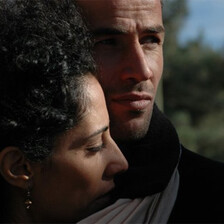The Electronic Intifada 11 May 2006
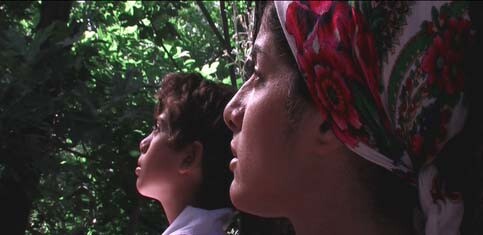
A scene from Rina Khoury’s West…East, a short film screened at the Chicago Palestine Film Festival’s Evening of Shorts.
This year’s Chicago Palestine Film Festival featured a shorts program hosted by Palestinian filmmaker Annemarie Jacir on Sunday, 7 May.
Rina Khoury’s West…East, is a nine minute narrative film about the Palestinian catastrophe that is told through the journey of a blind woman and her son, amidst an ambiguous landscape. Enas Muthaffar’s East…West is a sixteen minute documentary film that chronicles her family’s expulsion from their home as the apartheid wall encroaches nearby and threatens to segregate them from their community. Both films were shown in conjunction with two short films by Jacir, Some Crumbs for the Birds and An Explanation (and then burn the ashes).
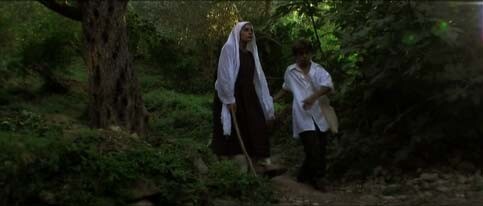
A still image from West…East, a short film by Palestinian filmmaker Rina Khoury.
Some Crumbs for the Birds is a documentary film set in Ruwaished, a remote truck-stop like village in Jordan, one stop away from the Iraqi border. The film was directed by Nassim Amouch with Jacir as the director of photography, while An Explanation is a six-minute experimental short about the witch-hunt of Middle Eastern Studies professors at Columbia University as told through a montage of the University’s architecture coupled with numerous verbal attacks on faculty members via campus voicemail. Albeit the intense narratives of both films, Jacir’s eye for captivating shots distinguishes her cinematic contribution to the festival’s program.
 In Some Crumbs for the Birds, Jacir created a fascinating portrait of some of Ruwaished’s inhabitants, who appear to live on the fringes of Jordanian society. Through interviews and a sorrow-filled song by an Iraqi-Palestinian band, Amouch and Jacir weave complex narratives through a handful of scenes that give insight into the devastating affects of ongoing conflicts in the Arab world. Subtle hints captured in both interviews and Jacir’s shots of the surrounding highway and landscape mark the Jordanian border village as a microcosm of devastated communities that result from war, occupation and economic exploitation.
In Some Crumbs for the Birds, Jacir created a fascinating portrait of some of Ruwaished’s inhabitants, who appear to live on the fringes of Jordanian society. Through interviews and a sorrow-filled song by an Iraqi-Palestinian band, Amouch and Jacir weave complex narratives through a handful of scenes that give insight into the devastating affects of ongoing conflicts in the Arab world. Subtle hints captured in both interviews and Jacir’s shots of the surrounding highway and landscape mark the Jordanian border village as a microcosm of devastated communities that result from war, occupation and economic exploitation.
Through the individual narratives of Ruwaished’s residents and the interior and exterior spaces which they occupy, Some Crumbs for the Birds takes the viewer through the unseen and often ignored tragedies of the displaced. Whether because of violent political conflict or the struggle for economic survival, many of the residents of the village have been thrown together due to circumstances beyond their control. The final scenes of the documentary take a dramatic turn as the narrative is intensified when the complexity of Ruwaished’s situation is reveled.
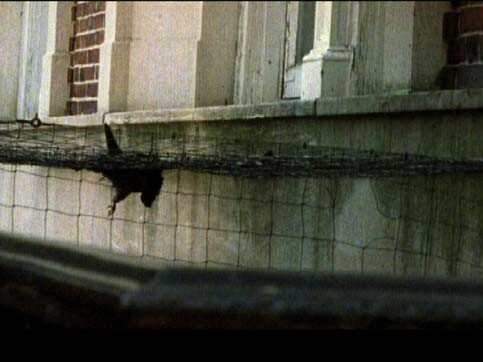
A still image from Palestinian filmmaker Annemarie Jacir’s short film An Explanation (and then burn the ashes), screened at the Chicago Palestine Film Festival.
In An Explanation (and then burn the ashes) Jacir uses the sterile architecture of Columbia University to almost box the viewer in as they are forced to sit through appalling omissions of bigotry and hate. Strewn throughout the sequences of the prestigious campus are cinematic compositions that could allude to the U.S. military industrial complex and its direct tie to freedom of speech (or lack there of) and even more specifically its creeping into American education. Shots of faceless campus guards and certain architectural features of campus buildings reminiscent of prisons or military barracks, juxtaposed with the violent nature of the verbal attacks on university faculty, create the visual rendering of a military like environment.
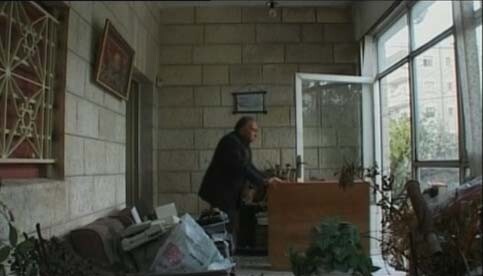
An image from Enas Muthaffar’s short film East…West, shown at the Chicago Palestine Film Festival’s Evening of Shorts.
Simultaneously, Jacir reminds the viewer of notions of the Western cannon of intellectual endeavor with images of Romanesque architecture that is engraved with the names of those associated with Western Classical thought. The viewer attempts to escape the discomfort of having to listen to the recorded assaults on university faculty, yet refuge can only be sought in the unwelcoming environment Jacir creates in her architectural portrait. The combination serves to recreate the tension surrounding the campus controversy which eventually is brought to a halt in Jacir’s film with a poetic and poignant ending. The brilliance of Jacir’s exploration being that not one human face is placed at the forefront of the controversy; in this regard the issue at hand becomes just a small part of the greater political picture we face in the U.S.
Maymanah Farhat is a freelance writer and researcher of visual arts and culture, and is a specialist in Modern and Contemporary Arab art. EI has sponsored the Chicago Palestine Film Festival since its inception.
Related Links:



